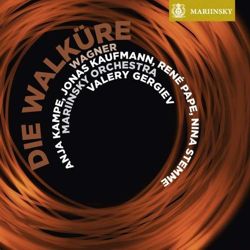|
|
|
|
|
|
|
|
|
Audiophile Edition, March 15, 2013 |
| Steven Ritter |
|
|
|
WAGNER: Die Walküre ***** |
|
| A sterling reading of superior value that hopefully flags the beginning of a compete Ring cycle. |
| |
 Gergiev
has again turned his attention to Wagner, and to good effect. I am a real
fan of his first foray into the Wagnerian corpus, a really first class
recording of Parsifal . And this from a man—me—who has been very critical of
this conductor in the past, and no doubt will find things to complain about
in the future. But surprisingly, and especially from a Russian conductor,
Gergiev seems to have a natural affinity for Wagner’s music. Gergiev
has again turned his attention to Wagner, and to good effect. I am a real
fan of his first foray into the Wagnerian corpus, a really first class
recording of Parsifal . And this from a man—me—who has been very critical of
this conductor in the past, and no doubt will find things to complain about
in the future. But surprisingly, and especially from a Russian conductor,
Gergiev seems to have a natural affinity for Wagner’s music.
Assuming
this is the first in a complete Ring cycle (and many times companies do
begin with Die Walküre as it is probably the most popular of the cycle) it
is off to an excellent start. My concerns when hearing Gergiev’s Parsifal
were the ability of the Mariinsky Orchestra to balance itself properly, an
absolutely essential requirement in Wagner, especially in the top-to-bottom
brass, and for a proper presentation of the voices in relation to the
orchestra. On both counts all fears were assuaged, and this remains the case
here as well. The orchestra is magnificent; a group that doesn’t always rise
to that level, but something about Wagner brings out the best in them.
Perhaps it is because a Wagnerian orchestra requires an equal strength
across all sections with no particular one standing out, and this is the
makeup of the Mariinsky Orchestra, not especially noted for brilliance of
brass tone or string sheen, but competence in all facets of performance.
They fit very well in this opera, laying down a foundation of sound that is
rich and thoroughly flexible when needed.
The voices are what
really win in this production, with not a weak link anywhere. Rene Papé is
becoming theWotan in our day and age, his voice strong and steely in timbre
while adroitly subtle in those moments where less force is required. Jonas
Kaufmann truly soars in the role of Siegmund—maybe the defining performance
of the modern recording age. Anja Kampe brings an invigoratingly
refreshing Sieglinde with no noticeable weaknesses in her voice, always
prepared for her high soaring lines without sounding in the least stressed
or strained. Nina Stemme’s Brünnhilde makes one long for the rest of this
Ring to continue as she find new ways to expressively convey the feelings of
the punished warrior in a manner not always in your face and
confrontational. And the Hundling of Mikhail Petrenko is wonderfully pointed
and strong in all aspects of his performance. The rest of the cast in the
more minor roles are never less than acceptable and frequently outstanding.
There have been some problems with the Mariinsky surround sound in some
past issues, but not here—these readings from three separate concert
performances spanning almost a year from 2011-12 are superior in all
respects, a model of how surround Wagner should sound. Productions values
remain high with texts and translations in an attractive booklet enclosed in
a box. Not to be missed.
|
|
|
|
|
|
|
|
|
|
|
|
|
|
|
|
|
|
|